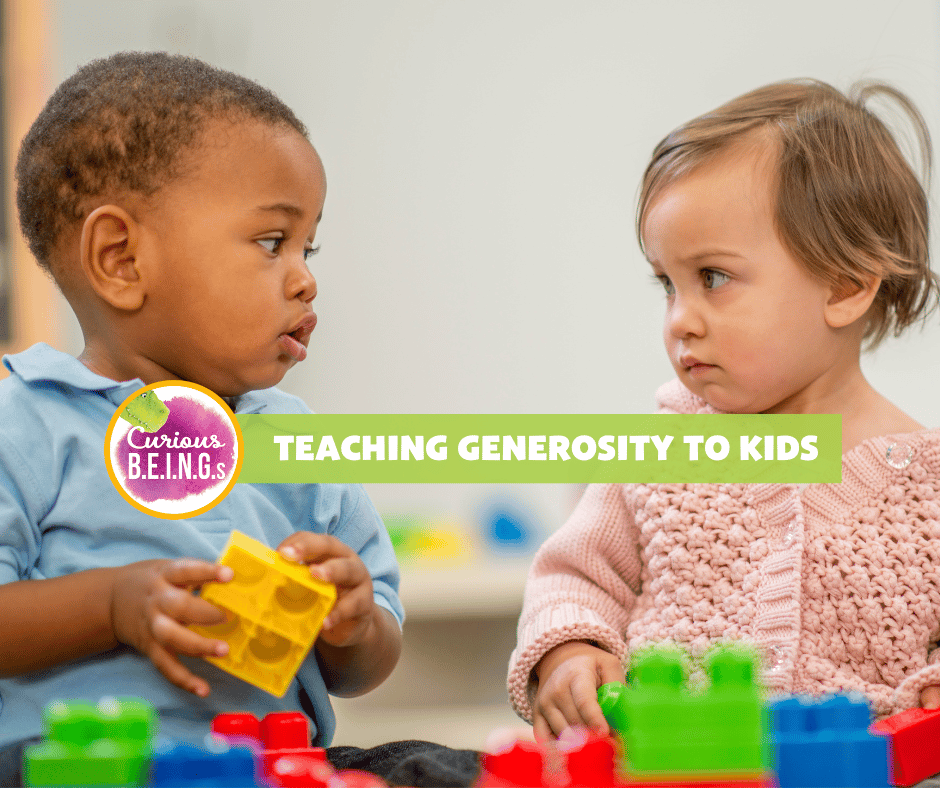By: Rebecca Macsovits, Author of Guion The Lion
Raising a generous child goes hand-in-hand with encouraging kindness and empathy in children. We all want to raise children who are genuinely generous, but generosity does not always come naturally to children. In reality, kids naturally think of themselves and their needs first and aren’t always up for sharing…
It’s up to us as parents and teachers to convey and teach the virtue of generosity.
Defining Generosity
Generosity is the quality of being kind, understanding, and selfless. It describes a willingness to give freely without expecting anything in return. And generosity is not all about material possessions or money. We can be generous with our time, talents, knowledge and love, too.
Teaching Generosity
Generosity is a wonderful trait to develop year round, but it is especially important to focus on during seasons when kids (and adults) may be tempted to focus on receiving, such as the holidays. Here are some ideas to help instill generosity into your kids:
- Demonstrate generosity. Teaching by example is one of the most effective ways to influence your child’s behavior. Do your actions demonstrate generosity? Do they reflect the same kindness you’d like your children to exhibit? Do your children notice you serving or giving to others? Point out the acts you do for others or what you donate to show your kids that being generous is a part of who you are.
- Show that sharing really is caring. Teaching your kids the importance of sharing is the first step toward instilling generosity. Sharing toys, books, games, snacks and treats is so tangible for children as these are typically the things they don’t want to share. Show them how sharing their things brings joy and happiness to the other child and how much fun they can have if they share and play together.
- Praise acts of generosity. Words of affirmation are important for young children.When you see your kids being generous, point it out and praise them. Help them put into words the positive feelings they experience as they help others. For example, “That was so kind of you to share your ball with your brother! See how happy it makes him!” Or, “Thank you so much for sharing your cookie with me. I’m so proud of you for sharing!”
- Make giving real. Younger children may not fully understand the impact of donating money to a charity, but they may find it easier to grasp the impact of giving away their own toys and clothes to children in need. Talk with them about ways they can give back and find activities or organizations that are aligned with their interests. For example, if your child loves reading, encourage them to select a few of their favorite books to donate. Children are more likely to be genuine in their generosity when they care about the cause or gift. Let them experience first-hand what it feels like to give.
- Use gift-giving occasions to teach about giving. As I mentioned above, times that tend to focus on receiving can be great opportunities to encourage generosity in your children. Talk about how good it feels to give, and help them think about what they can give to others. Encourage them to participate in gift-giving by helping to make a gift, contributing their allowance or even doing an “act of service” for a family member.
- Read books that present messages of generosity. Children’s books, like Guion The Lion, can be a great tool for teaching generosity, kindness, empathy and other emotions. Even at a young age, reading books allows children to see the impact of generosity illustrated in a fictional story. “The Giving Tree” by Shel Silverstein, “The Spiffiest Giant in Town” by Julia Donaldson share similar messages of generosity.
About Guion the Lion
Guion the Lion is a children’s book about an imaginative little lion who sees things differently from his friends. Using colorful illustrations and charming animal characters, the story portrays that new perspectives can open the door to unexpected fun. My vision for Guion The Lion is to present a message of empathy, generosity and adventure to support social emotional learning at an early age. Follow Guion the Lion on Facebook or Instagram to join the adventure!




